#Tensile Testing Machine Manufacturers
Explore tagged Tumblr posts
Video
youtube
Single Column Tensile Testing Machine GT-UA03
#youtube#tensile tester#universal testing machine#tensile strength machine#tensile strength testing machine#tensile testing equipment#universal testing machine for tensile test#universal testing machine tensile test procedure#tension testing machine#Universal Testing Machine Manufacturer#rubber tensile testing machine#universal testing equipment#gester instruments
1 note
·
View note
Text
Tensile Testing Machine Manufacturer and Supplier In India
Texcare Instruments Limited develops highly efficient machines like the Vacuum Leak Tester, Taber Abrasion Tester, and Martindale Abrasion Tester to support efficient, reliable testing across various materials. Our instruments help quality control teams detect weaknesses early, ensuring that only the best products make it to market. Engineered for low maintenance and long-term accuracy, Texcare machines offer significant operational advantages. With responsive customer service, custom options, and a wide product portfolio, Texcare is more than a supplier—we're a strategic ally. Our mission is to help you optimize your testing operations for speed, precision, and long-term success.
0 notes
Text
From Humidity Chambers to Testing Machines - India’s Expert Equipment Manufacturer
Kant Plastology has established itself as a leader in the field of manufacturing high-quality testing and processing equipment. With a strong focus on innovation and precision, we are dedicated to delivering solutions that meet the diverse needs of industrial, research, and development sectors across India and beyond. Our products are engineered with cutting-edge technology to ensure superior performance and reliability, making us a trusted partner for businesses and institutions.
We take pride in offering a comprehensive range of machinery that caters to different industries, including materials testing, manufacturing, and quality control. Our commitment to customer satisfaction drives us to continuously innovate and create products that help our clients achieve accurate and repeatable results. With strict quality control and advanced manufacturing practices, Kant Plastology ensures that every machine leaving our facility meets the highest industry standards.

Reliable Manufacturing Equipment for Industrial, Research, and Quality Control Needs
One of our standout products is the universal tensile testing machine, designed to deliver precision in evaluating material strength, elasticity, and tensile properties. This machine is vital for industries requiring consistent quality assurance in their production processes. Additionally, as a leading hydraulic press machine manufacturer in India, we offer robust solutions tailored for applications requiring high-pressure operations, ensuring efficiency and durability in every project.
Kant Plastology is also renowned as a humidity chamber manufacturerin India, providing equipment that offers controlled environments for testing materials under various temperature and humidity conditions. Furthermore, as a trusted tensile testing machine manufacturer, we focus on creating customizable solutions that cater to the specific testing needs of our clients.
At Kant Plastology, we believe in building relationships based on trust, quality, and exceptional service. Our goal is to empower businesses with reliable machinery that enhances their operational efficiency and supports their growth. Partner with us today and experience the expertise and dedication that set Kant Plastology apart in the industry.
#tensile testing machine manufacturer#humidity chamber manufacturerin India#hydraulic press machine manufacturer#universal tensile testing machine
0 notes
Text
Best Tensile Strength Tester in Delhi NCR – Buy Now
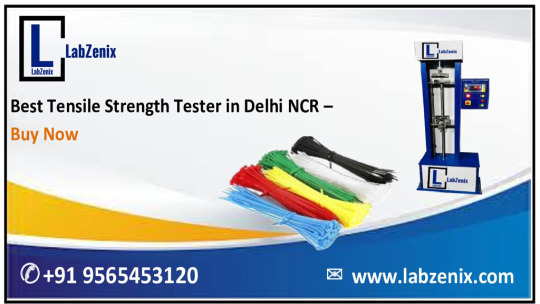
Why Choose LabZenix for the Best Tensile Strength Tester in Delhi NCR?
LabZenix has established itself as a leading manufacturer and supplier of tensile strength testers in Delhi NCR. Our machines are equipped with cutting-edge technology, ensuring precise and reliable results. Whether you are in the packaging, automotive, construction, or textile industry, our best tensile strength tester in Delhi NCR – buy now is the ideal choice for your testing needs.
#my writing#marketing#100 days of productivity#machine learning#commercial#tensile tester#tensile strength tester#tensile test#tensile strength#tensile structure manufacturer#tensile car parking#strength#wire test
0 notes
Text
Guide To choose the Right Tensile/Compression Strength Testing Machine
Despite the fact that Tensile/Compression strength testing machines are and utilized pretty much in every industry there is still absence of information with regards to buying the right machine. Given the scope of items, the features and the variations in cost getting one can be a bit overwhelming and this becomes especially true for non -standard applications.
One of the inquiries we get posed to by our clients is whether to pick a manually operated machine or motorized one and if motorized is chosen, would it be a good idea for us we pick a machine with Computer Control and inclusive of data acquisition. So, we should check out at this according to a point of view of a spring manufacturer.
There are two elements which go with this choice simpler. The first and most clear one is the price. Manually operated machines are less expensive obviously, then motorized lastly computerized. In any case, in the event that you are taking a heavier spring which are utilized in train bogies or airplanes, then, at that point, motorized ones must be utilized no matter what the budget. Imaging putting a pressure power of 5000 kg on a spring, (for example, the ones utilized under the train bogies) with a hand wheel. Indeed, even with utilization of a geared 3 train it's diligent effort.
Whenever that is chosen, the other element which is significant is the volume of testing. A spring manufacturer can let out a huge number of springs a day. The question then is whether to do batch testing or 100% testing. Batch testing is where you pick a couple of tests from the batch, test them and assuming all are good you say that the entire batch is good. In such cases a manual machine would be satisfactory. However, if one wants to test several thousand springs a day it's smarter to go for a motorized machine and reduce the burden of manual labour on the machine operator.
So, we decided on a manual or motorized machine. Subsequent stage in the development is whether to get a computer-controlled machine. These are machines operated straightforwardly from the computer and give the testing output as a force versus displacement chart. This imagines the way of behaving of the spring constantly. Regularly these software’s also provide a statistical report for all the tests, so min, max, standard deviation etc. and so forth. Are accessible as reports. Any large organizations where the report should be imparted to the higher ups who just need an outline of the production quality, these machines are a good decision. Any new product requiring data for approval must be tested on such machines. In many cases the client request that the manufacturer present the report online or in pdf format to avoid any possibility of manipulation. The best way to avoid from this is to utilize a computerized machine.
In specific cases the product you manufacture dictates the type of machine, there are ASTM, IS norms which settle on the decision for you. Be that as it may, for situations where it’s a non-standard product, we trust this article assists you with choosing what's best for you.
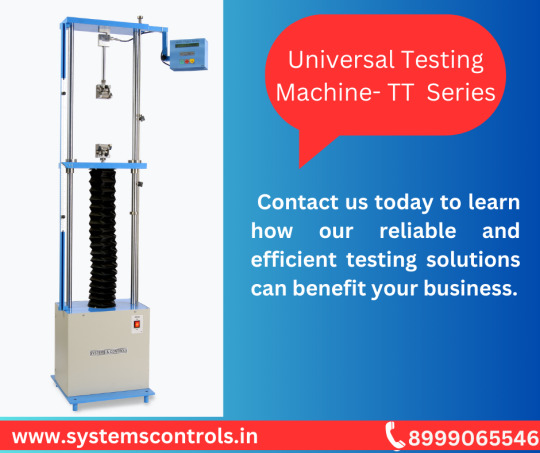
#utm#tensile#compressiontesting#stm#spring#universal testing machine manufacturers#mechanical engineering#manufacturer#springtesting#tensile testing machines
0 notes
Text
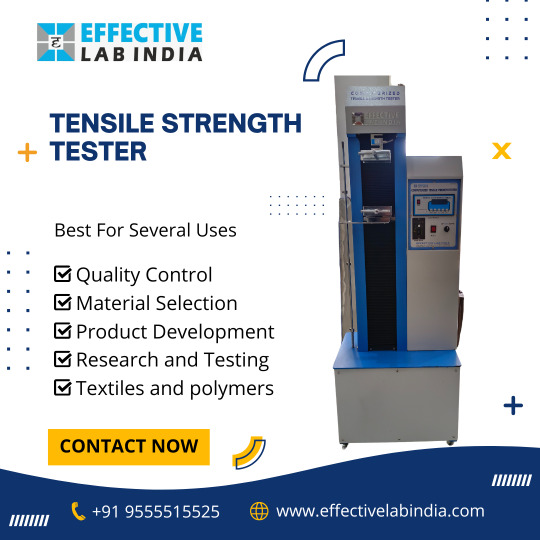
Tensile strength testing is a crucial procedure in various industries, ensuring the quality and durability of materials. A Tensile Strength Tester is a specialized equipment designed to measure the force required to pull a material until it breaks.
A Tensile Testing Machine is a precision instrument comprising various components such as a load cell, grips, and a testing chamber. Selecting the appropriate tensile strength tester involves considering factors such as material type, testing frequency, and required accuracy. Practical tips will be provided to aid in making an informed decision.
Emphasizing the need for regular tensile strength testing in different industries to ensure ongoing quality, safety, and compliance with standards. You can email us at [email protected] or call us at +91 9555515525 for additional information about the tensile testing machine's price, uses, or applications.
#tensile strength tester#tensile testing machine#tensile tester#tensile test equipments#tensile tester manufacturer
0 notes
Text
Measure the Breaking Force of Materials with a Tensile Machine
Tensile Machine is one of the finest lab testing instruments ever made due to its ergonomic design and universal versatility which comes together in a complete package. This test machine is also known as the Tensile Strength Tester, and as the name indicates it is used for measuring the strength or the force required to break the specimen.
The machine is offered universally in all the manufacturing industries as a manufacturer would tend to buy Tensile Tester rather than a load of other machinery and instruments.
It becomes highly important to meter the breaking strength of your material before utilizing the material in the final product. The Tensile Machine Tester is henceforth designed to regulate and make certain changes at the manufacturer level and deliver a flawless final product.
Read More -- https://www.testing-instruments.com/blog/measure-the-breaking-force-of-materials-with-a-tensile-machine/
#tensile strength tester#tensile strength tester manufacturer#tensile strength tester price#tensile strength tester supplier#digital tensile testing machine
0 notes
Text
Tensile Strength Testing Machine
The Tensile Testing Machine is a highly efficient and reliable device designed for testing the strength and durability of various materials. It is equipped with advanced technology that allows for precise and accurate measurements of tensile strength, elongation, and other mechanical properties. This machine is widely used in industries such as manufacturing, construction, and research laboratories to ensure the quality and performance of materials.
The Tensile Testing Machine provides:
# Advanced technology for accurate, precise measurements # Testing capabilities for tensile strength, elongation, and more # Reliable results you can count on # User-friendly interface requires minimal training # Ideal for manufacturing, construction, and research industries
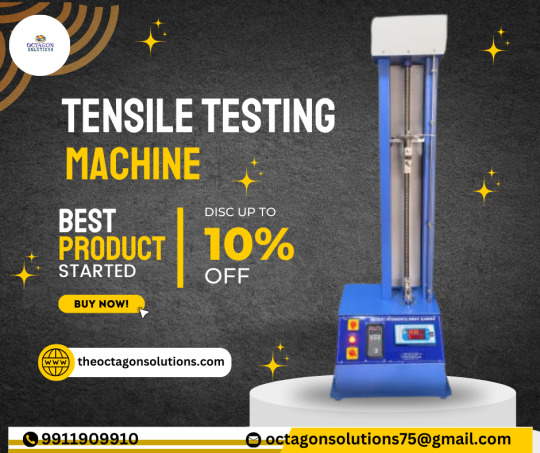
#Tensile Testing Machine#Material Testing#Quality Control#Mechanical Testing#Strength Testing#Engineering#Testing Equipment#Industrial Testing#Material Science#Manufacturing
0 notes
Text
Computerized Tensile Testing Machine -C SERIES

Computerized tensile testing machine provide precise and repeatable results, allowing for accurate characterization of material properties. They are commonly used in industries such as manufacturing, construction, research and development, and quality control to ensure material compliance, assess product quality, and aid in material selection and design.
These models are suitable for testing metals and iron, Plastics, Rubber, Ceramics, Fabrics, Composites, Cables and wires. Load is measured through a strain gauge based Load Cell and elongation is through rotary encoder. Depending upon the customers requirement a suitable type of grips are available. Extra Load cell can be offered suitable for low load samples.
Tensile testing machines include safety features to protect operators and prevent damage to the machine. These features may include emergency stop buttons, overload protection, and software-controlled limits for maximum force or displacement.
tensile testing machine, computerized tensile testing machine, universal testing system, computerized tensile testing machine supplier, computerized tensile testing machine manufacture, computerized tensile testing machine specification, computerized tensile testing machine best price, computerized tensile testing machine near by supplier, computerized tensile testing machine cost
#manufacture#industrial equipment#manufacturer#metallurgical#metallographicequipments#tensile testing#tensile testing machine#computerized tensile testing#computerized tensile testing machine#computerized tensile testing machine supplier#computerized tensile testing machine manufacturer#computerized tensile testing machine price#computerized tensile testing machine best price#computerized tensile testing machine near by#computerized tensile testing machine exporter#computerized tensile testing machine dealer
1 note
·
View note
Text
Best Tensile Testing Machine Manufacturers
Peak Technology is established in the year 2010 and we are trusted and reputed Tensile Testing Machine Manufacturers which is located in New Delhi. Our offered machines are equipped with advance techniques & tools and Tensile Testing Machine is widely used to tensile tester machine, a pulling force or tension is applied to a material until it fails or breaks and its response to the stress is measured.
Visit Here: - https://peaktest.in/tensile-test/
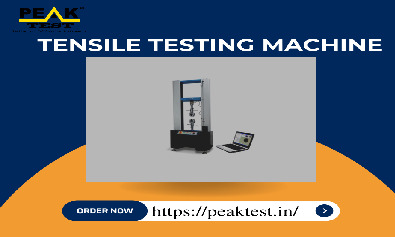
0 notes
Text
Tensile strength testing machine
Did you know that a tensile strength testing machine is important for evaluating the quality and durability of different materials? Well, it measures the maximum load a material can withstand before breaking or deforming.
#lab testing instruments#lab testing equipment suppliers#lab testing equipment#laboratory equipment manufacturer#tensile strength testing#tensile strength testing machine
0 notes
Text
Tensile Testing Machine for HDPE Sacks Manufacturer and Supplier In India
Texcare Instruments Limited offers a full suite of testing equipment, including the Peel Bond Strength Tester, Dart Impact Tester, and Laboratory Heat Sealer. Our machines are widely used across various industries to ensure materials meet performance expectations before reaching the consumer. Designed for both accuracy and ease of use, Texcare’s instruments streamline the testing process while delivering reliable outcomes every time. With our in-house expertise and customer-first approach, we provide full lifecycle support—from installation and training to maintenance and upgrades. Texcare’s commitment to excellence ensures that your investment in quality control always delivers measurable returns.
0 notes
Text
Kant Plastology – Innovating Industrial Machines for Superior Performance
Precision, durability, and innovation are the cornerstones of industrial success, and Kant Plastology stands as a leader in manufacturing high-quality testing and industrial machines. With a commitment to excellence, they provide reliable and advanced solutions tailored to meet the specific needs of diverse industries such as plastics, automotive, and aerospace. From cutting-edge designs to meticulous craftsmanship, Kant Plastology ensures their machines deliver optimal performance and long-term reliability.
The team at Kant Plastology is dedicated to understanding the unique challenges of their clients, crafting equipment that not only meets expectations but exceeds them. Their wide range of products reflects their expertise in delivering personalized solutions, whether clients require testing instruments for material analysis, production machinery, or laboratory equipment. This commitment to quality and innovation has made Kant Plastology a trusted partner for businesses seeking precision-engineered machines.

Efficiency Meets Expertise in Precision-Engineered Hydraulic Press Machines
For businesses in search of a reputed hydraulic press machine manufacturer, Kant Plastology offers durable and efficient solutions crafted with industry-leading expertise. Additionally, they excel in producing the universal tensile testing machine, a vital tool for evaluating material properties with exceptional accuracy and ease of use.
Their product line also includes advanced solutions for plastics testing, earning recognition as a trusted melt flow index tester manufacturer. Furthermore, for climate-controlled testing applications, they stand out as a notable humidity chamber manufacturer in India, delivering reliable performance and precision.
Kant Plastology’s focus on innovation, customer-centric support, and precision engineering ensures that every client receives unparalleled value. With their expertise, you can trust them to provide the right solutions to elevate your processes and achieve excellence in your operations.
#humidity chamber manufacturer in India#melt flow index tester manufacturer#tensile testing machine#hydraulic press machine manufacturer
1 note
·
View note
Text

I am the silhouette at 5' 6" IQ: est. 180-220
Leonardo di ser Piero da Vinci (15 April 1452 – 2 May 1519) was an Italian polymath of the High Renaissance who was active as a painter, draughtsman, engineer, scientist, theorist, sculptor, and architect. While his fame initially rested on his achievements as a painter, he also became known for his notebooks, in which he made drawings and notes on a variety of subjects, including anatomy, astronomy, botany, cartography, painting, and paleontology. Leonardo is widely regarded to have been a genius who epitomized the Renaissance humanist ideal, and his collective works comprise a contribution to later generations of artists matched only by that of his younger contemporary Michelangelo. Born out of wedlock to a successful notary and a lower-class woman in, or near, Vinci, he was educated in Florence by the Italian painter and sculptor Andrea del Verrocchio. He began his career in the city, but then spent much time in the service of Ludovico Sforza in Milan. Later, he worked in Florence and Milan again, as well as briefly in Rome, all while attracting a large following of imitators and students. Upon the invitation of Francis I, he spent his last three years in France, where he died in 1519. Since his death, there has not been a time where his achievements, diverse interests, personal life, and empirical thinking have failed to incite interest and admiration, making him a frequent namesake and subject in culture. Leonardo is identified as one of the greatest painters in the history of art and is often credited as the founder of the High Renaissance. Despite having many lost works and fewer than 25 attributed major works—including numerous unfinished works—he created some of the most influential paintings in Western art. His magnum opus, the Mona Lisa, is his best-known work and often regarded as the world's most famous painting. The Last Supper is the most reproduced religious painting of all time, and his Vitruvian Man drawing is also regarded as a cultural icon. In 2017, Salvator Mundi, attributed in whole or part to Leonardo, was sold at auction for US$450.3 million, setting a new record for the most expensive painting ever sold at public auction. Revered for his technological ingenuity, he conceptualized flying machines, a type of armored fighting vehicle, concentrated solar power, a ratio machine that could be used in an adding machine, and the double hull. Relatively few of his designs were constructed or were even feasible during his lifetime, as the modern scientific approaches to metallurgy and engineering were only in their infancy during the Renaissance. Some of his smaller inventions, however, entered the world of manufacturing unheralded, such as an automated bobbin winder and a machine for testing the tensile strength of wire. He made substantial discoveries in anatomy, civil engineering, hydrodynamics, geology, optics, and tribology, but he did not publish his findings and they had little to no direct influence on subsequent science. - from Wikipedia
#art#drawing#illustration#sketch#artwork#artist#history#historical figure#da vinci#leonardo da vinci#polymath#lineart#illustration art#illustrators on tumblr
6 notes
·
View notes
Text
Premium White Hard PTFE Sheets for Demanding Industrial Applications
Aohong's white hard PTFE sheet stands as a benchmark in high-performance fluoropolymer solutions, delivering exceptional mechanical strength and chemical resistance. Manufactured from 100% virgin PTFE (polytetrafluoroethylene), these rigid fluoropolymer sheets maintain superior dimensional stability across extreme temperatures (-200°C to +260°C), outperforming conventional filled PTFE variants in purity and longevity.
Unmatched Material Properties
Our pure white PTFE sheets exhibit critical advantages:
0.02% deformation under 20MPa compressive load (ASTM D695)
28MPa tensile strength – 40% higher than recycled PTFE blends
60kV/mm dielectric strength (IEC 60243 at 200°C)
Zero moisture absorption – ideal for semiconductor cleanrooms

Microscopic analysis reveals a homogeneous crystalline structure with <0.1% void content, achieved through Aohong's proprietary isostatic pressing technology.
Precision Manufacturing Process
At our ISO 9001:2015-certified Suzhou facility, each sheet undergoes:
Ultra-fine resin filtration (99.99% purity)
Cold compaction at 65MPa for density uniformity
Controlled sintering (375±5°C for 20 hours)
Precision machining to ±0.03mm tolerances
This process yields FDA-compliant white PTFE sheets meeting:
USP Class VI biological safety standards
EU 10/2011 food contact regulations
RoHS 3 Directive compliance
Industrial Applications
Medical Devices
MRI component insulators
Autoclavable surgical tool handles
Food Processing
Non-stick conveyor liners
Dairy equipment gaskets
Semiconductor
Wafer carrier components
Plasma etch chamber liners
Chemical Processing
Hydrofluoric acid tank linings
Chlor-alkali cell seals

Quality Verification
Every production batch includes:
FTIR spectroscopy for molecular integrity checks
DSC analysis confirming 327±2°C melt point
X-ray diffraction testing crystallinity (15-20% range)
100% thickness gauging with laser micrometers
Recent third-party testing demonstrated 300% longer service life versus Chinese Q/YZB standards for PTFE sheets in sulfuric acid exposure.
Customization Options
Aohong provides tailored solutions:
Thicknesses from 0.5mm to 150mm
Anti-static versions (10⁶-10⁹ Ω/sq)
High-wear grades with 15% improved abrasion resistance
FDA white color-stable formulations
Pre-cut blanks for CNC machining
Why Aohong Excels
With 18 years of PTFE specialization, we offer:
12-month performance guarantee
Teflon™-equivalent properties at competitive pricing
Technical support from materials PhDs
Case Study: A Shanghai semiconductor fab reduced particle contamination by 92% after switching to our ultra-clean white PTFE sheets for wafer handling.
Advanced White PTFE Sheet Solutions for Critical Environments Contact Aohong today to request samples or discuss your application requirements. Our engineers combine deep material science expertise with practical experience from 1,200+ successful installations worldwide.
2 notes
·
View notes
Text
5 Reasons to Choose Stainless Steel Bars for Your Next Project
When deciding on the right material for your project, you will want it to be strong, reliable, and long-lasting, will you not? Your ideal material is stainless steel bars ! Whether you are working on the construction site or crafting machines with some shiny interiors, stainless steel imparts unmatched durability and is perfectly polished to stand the test of time.
Furthermore, it does not rust, is resistant to heat, and does not wear easily, thus making it a smart investment for practically all applications. But it's not just that: stainless steel is also very friendly to the environment and fairly inexpensive in the long run. Do you wonder what makes it a favorite among so many industries? We have compiled the five principal reasons why stainless steel bars should be at the top of your list. Without further delay, let’s get to the points!
This Breaks the Stamina: Why Stainless Steel Bars Are Strong
If strength is one of your top concerns, then you can be guaranteed that stainless steel bars will not let you down. Having great tensile strength, they do not bend and break under heavy loads, pressures, and conditions. Unlike most metals, stainless steel like 304 stainless steel coil does not lose its structure in an unfavorable environment, hence ideal for use in construction, automotive, and industry. Chromium and nickel have many characteristics, including wear and tear, corrosion resistance, and high durability. If you are looking for reliability when building skyscrapers or precision machinery, take heart: the stainless steel bars have you covered.
Say Goodbye to Rust: An Advantage Against Corrosion
Rust and corrosion go a long way to cutting down the strength of a material. However, the stainless steel bars have been created and engineered to resist such elements. Thanks to the chromium content, stainless steel perforated sheet and bars achieve a thin yet firm layer of oxide that primarily prevents rust in humid, salty, or chemically aggressive conditions; hence, they are ideal outdoor structures in marine and industrial settings, subjected to intense moisture. Steel bars, as such, keep on functioning without that heavy upkeep that regular steel would mean. These bars bide time for you against rain, humidity, or chemicals. You can rest assured that with stainless steel, you're investing for life without worrying about rust devouring your equity!
Minimal Maintenance: Quality Service
Nobody likes to spend time and effort on repairs and maintenance, and stainless steel bars help to remedy that. They do not rust, stain, or scratch easily; therefore, they look good with little hassle. Unlike other materials that may need coatings, constant treatment, or even replacement, the state of stainless steel is stable and will stand the test of time for years. A simple soap and water wipe-down will keep those shiny surfaces in very good condition. At the same time, surface damage repairs itself on stainless steel because of the self-healing oxide layer, lengthening its life. You get something that looks good and, unlike others, requires less tending.
Standard or Stylish: Wonderful Finish to Stainless Steel Bars
While looks always matter, one must not forget about function! Textured sheet metal not only delivers strength but also offers a clean-polished appearance for just about any project. Be it an architectural structure, home interior, or industrial equipment, you just cannot go wrong with sleek and shiny surfaces. They also come in many finishes, such as brushed, matte, or even Mirror stainless steel, so you can really coordinate varieties of styles too. Otherwise, as a metal, stainless steel does remain bright and shiny throughout time, with very little care.
Sustainable Development and the Manufacturing Industry of Stainless Steel
If anyone needs a material that is the best performer and is also nature-friendly, then surely stainless steel would really fulfill the needs. It is 100% recyclable and can be easily re-melted into new shapes without any loss of quality or strength. A different material only probably goes to landfills whereas stainless steel can be melted and reused thereby reducing waste and conserving resources. Also, its durability means there would have to be replacements less often, which adds up to less impact on the environment over time. It is for these greener benefits; various industries have chosen stainless steel to be a foremost consideration for sustainable construction and manufacturing. By choosing stainless steel, you make an investment not only in quality but also in the environment!
Conclusion
Steel constitutes the best combination of strength, ruggedness, and long-term value, and is good for work and application. With great resistance properties against rust and heat, and requiring little maintenance, they grant virtues that other materials cannot obtain. Whether in construction, manufacturing, or design, stainless steel ensures an economical, dependable, and modern decent look.
If you are interested in high-quality stainless steel, Jianglin Stainless Steel will provide you with premium quality materials for longer service. Reach us now to have your stainless steel meeting your needs!
2 notes
·
View notes